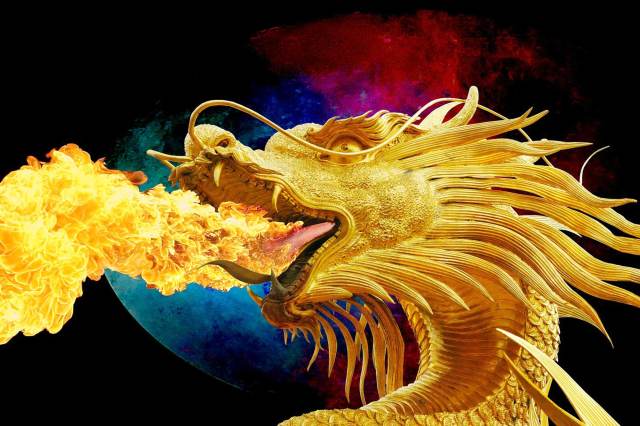Chinese dragon breathing fire

The idea of a ‘world order’ is one that conspiracy theorists will be familiar with. Secret societies run the show and we’re the puppets. Or is that just what they told me to say?
In reality, anything on worldwide scale is pretty much impossible to hide. Indeed, the current world order is plainly visible. This is how Meghan L. O’Sullivan for Bloomberg describes it:
“…[the] product of enormous effort on the part of the U.S. and its Western allies to create and sustain the set of norms, institutions and frameworks undergirding an international order based on the values of participatory governance, respect for state sovereignty and liberal economic interaction.”
In the post-war period, the Western world order had a rival in the shape of the Soviet Union. But with the conclusion of the Cold War, matters were settled. Not anymore though:
“This liberal international order… is under strain from both of the two tendencies that eventually challenge every world order in the view of scholars and statesmen. First is self-doubt…
“…The second challenge – also clear in today’s world – is when the international order struggles to accommodate significant changes in relations between major powers. China’s relationship to the current world order is particularly problematic.”
China takes a ‘not invented here’ attitude to institutions and understandings established by Americans and Europeans 70 years ago:
“While perhaps no single country has benefited more from the economic structures in place over the last 70 years, China rejects the political constructs that often accompany them. Moreover, China had little say in the development of the rules of this order… Now, as a global power, Beijing is skeptical about both the legitimacy of these rules and their applicability to China and much of the world.”
Does that mean we’re heading for a new Cold War in which rival world orders battle for supremacy? Or might we get a new world disorder, in which there are no ground rules and global leaders improvise in Trump-like fashion?
O’Sullivan suggests a third outcome, a newish world order in which the Chinese come onboard – but at a price. Her key insight is that improved energy security means a less defensive China:
“…the energy boom has increased the confidence of critical players, most notably China, in the market. When energy was perceived as scarce, there was a trend of growing reliance on non-market measures to secure energy needs…
“For instance, Beijing’s strategy of acquiring oil and gas resources in Africa and Latin America – intentionally or not – led China to support its own gallery of rogues; it cultivated relationships with governments acting decidedly outside the norms of the international order.”
With new sources of oil and gas coming on-stream, plus big advances in renewable energy, the existing world order doesn’t look so bad after all.
The quid pro quo is that China wants a piece of it. Consider the International Energy Agency (IEA) – founded as a club for the energy-consuming countries of the free world. As O’Sullivan explains, the IEA was “constructed under the auspices of the Organization for Economic Cooperation and Development”:
“By its charter, all members of the OECD – and therefore the IEA – must be led by democratic governments with a commitment to market economies. For many years after the establishment of the IEA, this subset of countries coincided nicely with the large energy- and oil-consuming countries of the world.”
The People’s Republic of China is a communist dictatorship not a democracy, but that hasn’t stopped the IEA from cosying-up to the PRC:
“…on taking the helm of the IEA in September 2015, executive director Fatih Birol made Beijing the destination of his first official trip… In the months that followed, the IEA opened a joint energy center in Beijing. China and other Asian countries also activated an ‘association status,’ granting them access to a wide variety of data, training, and discussions at the IEA.”
And this is just one example of the way that the world order is changing. A bigger one is the shift in power from the G7 group of democratic nations to the G20, which includes China and other non-democracies.
Rather like China itself, the world order is adapting to extend capitalism. Democracy, however, is strictly optional.










Join the discussion
Join like minded readers that support our journalism by becoming a paid subscriber
To join the discussion in the comments, become a paid subscriber.
Join like minded readers that support our journalism, read unlimited articles and enjoy other subscriber-only benefits.
Subscribe